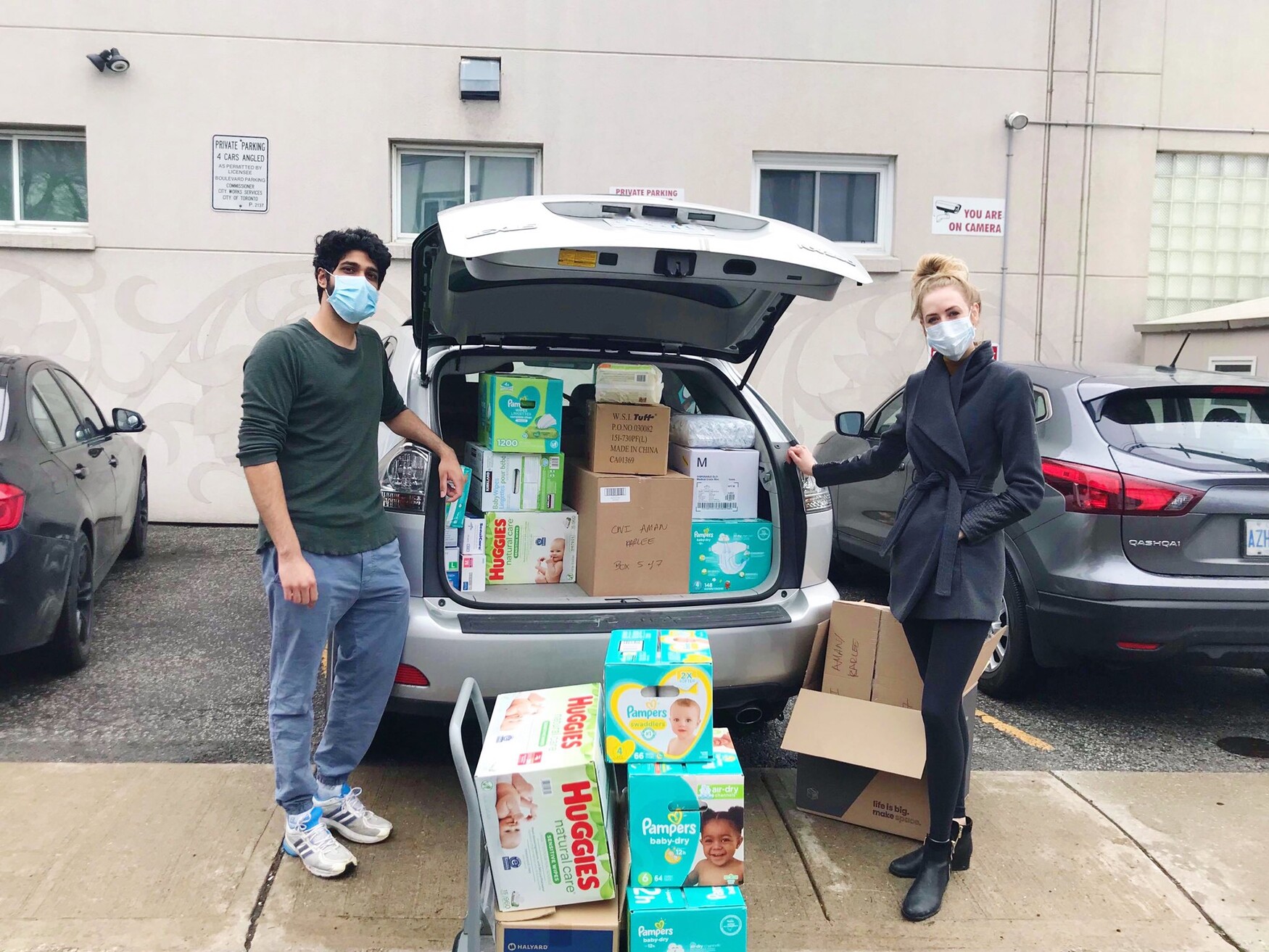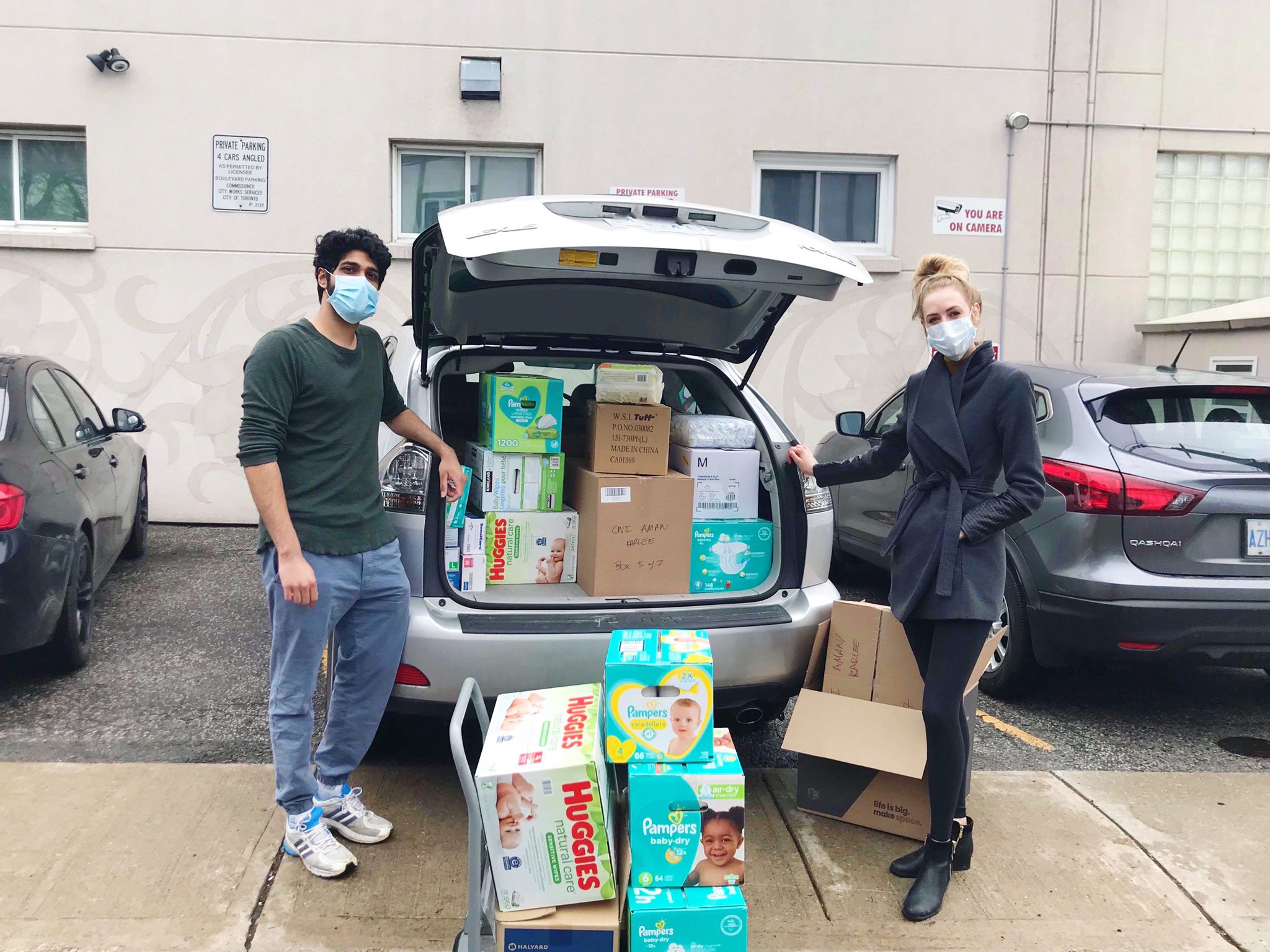Breadcrumbs
- Home
- MD/PhD Program
- News
- U of T Med Students Assist Women’s Shelters During COVID-19
U of T Med Students Assist Women’s Shelters During COVID-19

Ciara Parsons

Public health advice to shelter in place and keep a physical distance can be challenging — and dangerous — for women living in unsafe environments. As a result, many women are seeking help in women’s shelters, which have seen a sharp uptick in requests for their services.
To help meet that growing need, medical students from the University of Toronto started the COVID-19 Women’s Initiative (CWI) to collect funds, donate items and expand access to crisis hotlines, sexual and reproductive health care and other critical services.
Second year students Karlee Searle and Aman Dhaliwal began the initiative in April after they learned women’s shelters needed support and were running low on supplies and funding. Almost 250 volunteers from medical schools across Canada have now signed up to volunteer. Searle and Dhaliwal recently spoke about the impact of the pandemic on women, and why volunteers are inspired to help.
What is the focus of CWI?
The COVID-19 Women’s Initiative is a non-profit, student-led organization comprised of medical students, physicians and community members. Our goal is to advocate for gender equity during the pandemic. Together, we’re working on several projects and partnering with health care professionals to support women through the pandemic as it evolves. We have helped 30 women’s shelters across the country so far and raised about $22,000 since we started. Our group has also provided about 700 meals to residents in women's shelters and donated thousands of items to date.
Why did you decide to create the initiative?
Initially, we started hearing about a global increase in the incidence of domestic violence as the COVID-19 pandemic progressed. Statistics Canada reported that one in 10 Canadian women are fearing violence at home during the pandemic.
We learned that women’s shelters were becoming overwhelmed and required more funding to keep up with the volume of need they were experiencing. Due to limited space and social distancing, there was also a concern that women in need were being turned away or, alternatively, not even seeking help due to fear of COVID-19.
We also noticed that the pandemic has led to more barriers to accessing sexual and reproductive health services. Because of the pandemic, people are not leaving their homes as much and may fear even going to places like pharmacies where they can get contraception. Normally, this wouldn’t be a problem. Clinics are also operating on different hours or limiting the number of procedures they’re offering, so this adds a layer of complication for women who are in urgent situations and need assistance.
As medical students, we knew we couldn’t be on the front lines but felt a strong desire to help out in our community to address gender disparities that the pandemic is exacerbating. We recognize the effects of the COVID-19 pandemic will have long-standing negative consequences for women unless individuals make an effort to intervene early.
How did you expand your partnerships?
Fellow classmates and students from other Canadian medical schools reached out to us because they were eager to address these issues in their respective cities. We have volunteers from Western University, McMaster University, University of Ottawa, University of Calgary and the University of British Columbia.
CWI is also collaborating with the U of T Obstetrics and Gynecology resident advocacy team, led by Dr. Emma Skolnik. Collaboratively, our teams are working to address food insecurity, increase awareness of intimate partner violence, promote greater access to sexual and reproductive health services and to create informational materials on maternal mental health.
Dr. Suvercha Pasricha from the Women’s Inpatient Unit at the Centre for Addiction and Mental Health has also helped guide our initiatives and has assisted with creating awareness for our fundraising efforts to benefit women’s shelters.
Our initiatives have also been guided by the mentorship of multiple healthcare professionals at Women's College Hospital in Toronto.
Why is it important to advocate for access to sexual and reproductive health services during the pandemic?
Sexual and reproductive health services are essential and we believe that access to them is a fundamental human right. The pandemic has heightened the structural and social barriers to accessing these services, for example through clinic closures, PPE shortages, financial insecurity and reduced autonomy due to unsafe relationships. Increasing access to these services is fundamental to prevent long-term consequences for vulnerable women and healthcare systems.
Part of our work was to design an online Sexual and Reproductive Health Services Map, with Obstetrics and Gynecology residents from U of T. The map helps people find sexual and reproductive health services clinics within the GTA that are open during the pandemic. We know some people are looking for medical help with things like contraception and emergency IUD insertions, STI screening and treatment, abortion services and pap testing. We’re now working to expand this map provincially and nationally.
Will you maintain the map after the pandemic has passed?
We will be keeping the map live, but we are also looking to extend it and add more providers and clinics that are offering sexual and reproductive services, in the GTA and across the country. Our goal is to improve the accessibility of sexual and reproductive services, no matter what the circumstances may be.
How are medical students trained to manage the crisis line?
Some medical students had previous crisis line volunteer experience, but for this live chat, all volunteers were trained through pre-established sessions at the Redwood shelter.
They have completed training that all Redwood crisis line workers normally complete but in an expedited process. The training sessions are conducted remotely via Zoom and include anti-oppression and anti-racism onboarding training, followed by crisis-specific training.
As crisis line operators, students respond to women who are survivors of domestic violence and who reach out for help through an online live chat. They direct women to relevant resources or the Assaulted Women’s Helpline. If callers are in immediate danger, volunteers will encourage them to call 911. The executive director of Redwood will be available during these live chat sessions in case volunteers need assistance.
How can people get involved if they are interested?
If people are interested in volunteering with CWI or have any suggestions, they can reach us through our website. People can also share our messages, infographics and resources on social media to increase awareness about the challenges some women are facing and how we are advocating for women through the pandemic. The initiative is also collecting monetary donations online, which will support women’s shelters.
News


